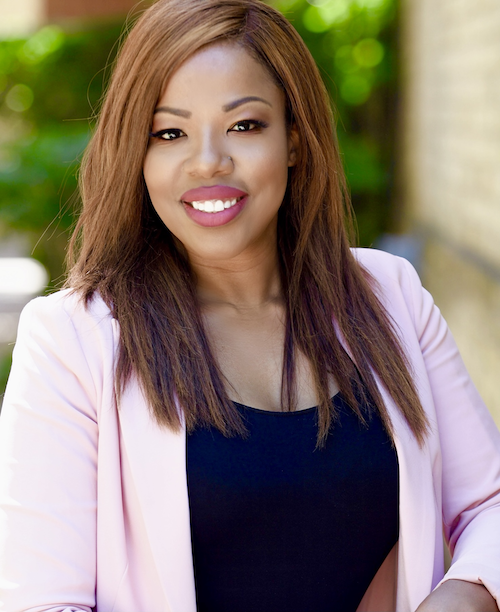Rhonelle Bruder: Rising and Making Space in New Places
September 2/2021
by Françoise Makanda, Communications Officer at DLSPH
Rhonelle Bruder starts her PhD in September at U of T after decades of advocacy work to improve health outcomes for marginalized communities and survivors of human trafficking.
“I come from the nonprofit sector but I want to pursue a PhD to advance my research and leadership competencies in the field of gender-based violence and develop the skills necessary to work collaboratively across academic, community, and government sectors,” says Bruder who is also the founder of Project iRISE a survivor-led, community-based nonprofit organization with a mission to educate and empower survivors and those at risk of human trafficking.
“When we think of academia and scholarship it’s often a very exclusive club. With that, it is not easy to access for people who have taken a nontraditional education pathway. People like myself or folks with similar lived experiences do not always feel welcome in these spaces,” says the new PhD student in the Social Behavioural Health Sciences program stream at DLSPH.
Her desire to pursue further education is born out of her own experiences facing homelessness and human trafficking. She began her undergraduate studies at 27 years old as a single mother in New York after dropping out of high school a decade prior. After spending two years in community college, she undertook a bridging program to complete her undergraduate degree in the Health Services Administration from New York City College of Technology.
Bruder also earned a Master of Science in Health Informatics from the University of Victoria. Managing multiple priorities was exhausting, she says, but failure was not an option, education was the way forward.
Her resume includes the development of anti-trafficking educational platforms, videos used by law enforcement, hospitality, healthcare sectors and parents to spot the signs of human trafficking. She has also sat on multiple government advisory committees and worked with organizations to push human trafficking at the forefront of social issues.
“Young people, often marginalized women—Black, Indigenous and Trans people—are more vulnerable to trafficking. They face increased societal and community risk factors such as systemic racism, intergenerational trauma, transphobia, and the impacts of colonization. I wanted to create a program that would be survivor-centered, trauma-informed, and honour the experiences of survivors while helping to empower them and sustain their healing. I did it through Project iRISE.”
Project iRise has already earned support from the Ministry of Children, Community, and Social Services as part of Ontario’s comprehensive Anti-Human Trafficking Strategy 2020–2025, to improve support services for survivors of human trafficking.
Her thesis will evaluate current best practices in community-based frameworks and their impact on survivors of human trafficking. She’s also enrolled in the collaborative specialization in women’s health. She will explore women’s health within the sexual violence construct, intersectionality, and community-based interventions under the supervision of Prof. Janice Du Mont.
“I think, historically, public health has overlooked lived experience as a form of legitimate and valuable expertise,” says Du Mont, “Centering the leadership of survivors in anti-sex trafficking and broader gender-based violence initiatives are crucial to ensuring that our responses improve health and social outcomes for these communities. Survivors know their needs best and as public health researchers, policymakers, and practitioners, we have a profound obligation to amplify and respond to their voices.”
Although developed with good intentions, Bruder says anti-trafficking programs often cause unintended harm when recipients are not consulted for program input. “If you don’t have the people with lived experience at that table designing programs and informing policy, you’re setting yourself up for failure.” She points to the healthcare responses to trafficking.
It requires trauma-informed and holistic care that can be meaningfully informed by survivors. Project iRISE was built in 2020 to change that. The founder and her team work with people with lived experiences to develop, adapt and deliver programs. Survivors are part of the programming as well and their input is added every step of the way. Bruder calls it a “peer-to-peer” model.
“If clinician training is not survivor-informed, it risks focusing more on the needs of the health care providers than that of the survivors,” says Bruder. “The training may help clinicians intellectualize what trafficking is and how a victim presents but misses out on the most critical component — caring for a victim of trafficking when they enter an emergency room or doctor’s office because supporting victims of trafficking cannot be a checklist item with cookie-cutter approaches.”
Bruder wants to apply her thesis findings to design and deliver foundational programs for other marginalized communities. “Ultimately, I hope to develop a framework that may be adapted for vulnerable populations beyond trafficking victims and survivors including women who experience other forms of gender violence.”
She is eager to make a difference in spaces she wants to join and empower others with lived experience to pursue academia.
“By engaging people with lived experience, we not only advance their well-being through education but help to contribute to all areas of scholarship. Whether they’re helping inform a research project or working alongside as a peer researcher, we have an untapped market of expertise just waiting to be seen and for the opportunity to contribute.”
